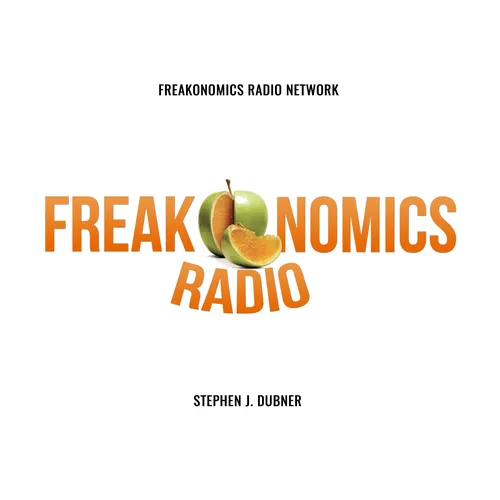
Freakonomics Radio
Freakonomics co-author Stephen J. Dubner uncovers the hidden side of everything. Why is it safer to fly in an airplane than drive a car? How do we decide whom to marry? Why is the media so full of bad news? Also: things you never knew you wanted to know about wolves, bananas, pollution, search engines, and the quirks of human behavior.
To get every show in the Freakonomics Radio Network without ads and a monthly bonus episode of Freakonomics Radio, start a free trial for SiriusXM Podcasts+ on Apple Podcasts or by visiting siriusxm.com/podcastsplus.
- Update frequency
- every 5 days
- Average duration
- 41 minutes
- Episodes
- 857
- Years Active
- 2010 - 2025

227. Should Everyone Be in a Rock Band?
Lessons from Tom Petty's rise and another rocker's fall.

226. Food + Science = Victory!
A kitchen wizard and a nutrition detective talk about the perfect hamburger, getting the most out of garlic, and why you should use vodka in just about everything.

225. Am I Boring You?
Researchers are trying to figure out who gets bored - and why - and what it means for ourselves and the economy. But maybe there's an upside to boredom?

How to Save $1 Billion Without Even Trying (Rebroadcast)
Doctors, chefs, and other experts are much more likely than the rest of us to buy store-brand products. What do they know that we don't?

224. How To Win A Nobel Prize
The process is famously secretive (and conducted in Swedish!) but we pry the lid off at least a little bit.

223. Should Kids Pay Back Their Parents for Raising Them?
When one athlete turned pro, his mom asked him for $1 million. Our modern sensibilities tell us she doesn't have a case. But should she?

222. Meet the Woman Who Said Women Can’t Have It All
Anne-Marie Slaughter was best known for her adamant views on Syria when she accidentally became a poster girl for modern feminism. As it turns out, she can be pretty adamant in that realm as well.

221. How Did the Belt Win?
Suspenders may work better, but the dork factor is too high. How did an organ-squeezing belly tourniquet become part of our everyday wardrobe -- and what other suboptimal solutions do we routinely pu…

220. “I Don't Know What You've Done With My Husband, But He's a Changed Man.”
From domestic abusers to former child soldiers, there is increasing evidence that behavioral therapy can turn them around.

219. Preventing Crime for Pennies on the Dollar
Conventional programs tend to be expensive, onerous, and ineffective. Could something as simple (and cheap) as cognitive behavioral therapy do the trick?

218. The Harvard President Will See You Now
How a pain-in-the-neck girl from rural Virginia came to run the most powerful university in the world.

217. Are You Ready for a Glorious Sunset?
We spend billions on end-of-life healthcare that doesn't do much good. So what if a patient could forego the standard treatment and get a cash rebate instead?

216. How to Make a Smart TV Ad
Step 1: Hire a Harvard psych professor as the pitchman. Step 2: Have him help write the script ...

The Dangers of Safety (Rebroadcast)
What do NASCAR drivers, Glenn Beck and the hit men of the NFL have in common?

215. Why Do We Really Follow the News?
There are all kinds of civics-class answers to that question. But how true are they? Could it be that we like to read about war, politics, and miscellaneous heartbreak simply because it's (gasp) ente…

214. How to Create Suspense
Why is soccer the best sport? How has Harlan Coben sold 70 million books? And why does "Apollo 13" keep you enthralled even when you know the ending?

213. Aziz Ansari Needs Another Toothbrush
The comedian, actor -- and now, author -- answers our FREAK-quently Asked Questions

212. The Economics of Sleep, Part 2
People who sleep better earn more money. Now all we have to do is teach everyone to sleep better.

211. The Economics of Sleep, Part 1
Could a lack of sleep help explain why some people get much sicker than others?

A Better Way to Eat (Rebroadcast)
Takeru Kobayashi revolutionized the sport of competitive eating. What can the rest of us learn from his breakthrough?